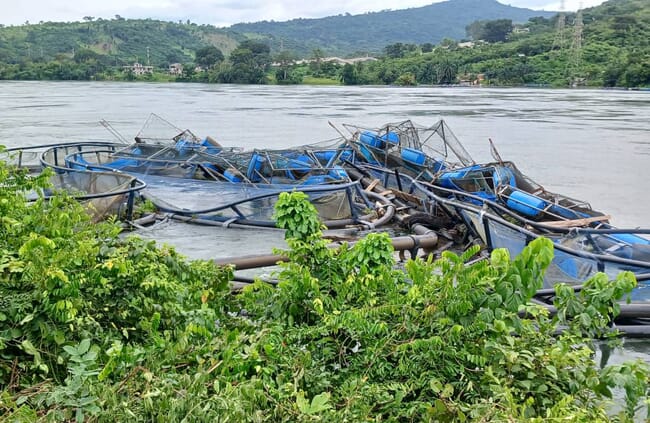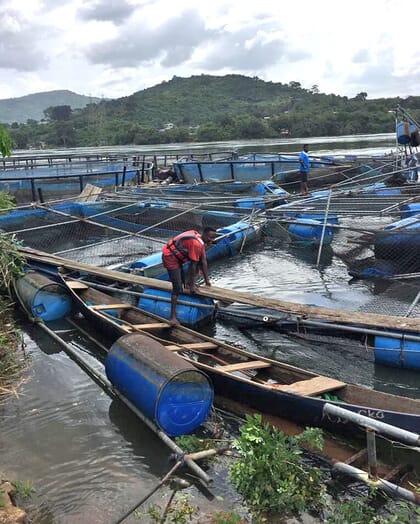
The lake is the heart of Ghana's tilapia farming sector, accounting for over 80 percent of the country's output
On September 12, the VRA announced that it was about to start “controlled spilling” as a safety measure, and advised people in the nearby areas to take precautionary measures. Over the next few days, quite a number of cages were swept away, and fish with an estimated value of 46 million cedis ($3.9 million) were lost.
On October 10, the VRA sent out a warning about another impending spillage, but by midday this writer saw many damaged cages being swept southwards towards Sogakope and nearby areas. Farmers have reported more losses of cages and fish. John Domozoro, CEO of PBA Farms and secretary of the Ghana Aquaculture Association, said that “what we are seeing is a major loss of capital to the industry and to the nation. This will certainly affect the supply and prices of fish in Ghana and even neigbouring countries. The serious thing is that this is not over. We could witness more of such occurrences”.
Sejiro Oke-Tojinu, an aquaculture executive based in Lagos, who is attending a workshop for senior fish farm managers at Flosell Farms, said: “I have never seen such damage in my life. I could see, from my hotel, lots of cages accompanied by aquatic waste, being washed aware. Lots of resources have been lost, and my heart goes out to the affected farmers.”

The Fisheries Commission has expressed its sympathy with the affected farmers and advised them to, among other things, “move their cages from the main water ways to near banks of the river”, and “improve their anchorage by tying long rope to the cages and extend the rope to the banks to hold onto trees or pegs fixed at the banks”.
The commission encouraged farmers to get involved in current discussions with insurance companies aimed at developing affordable insurance packages for fish farmers.
Dr Charles Biney, formerly director of the Burkina-based Volta Basin Authority, has discounted speculations that the floods were the result of the opening of the Bagre Dam by the Burkina Faso authorities. He said that “the opening of the Bagre Dam may have affected a few farms and communities in northern Ghana, but what is happening in the areas around the Volta is directly related to the rains. The Volta River Authority has tried to manage the situation to prevent a disaster. I would also encourage our authorities to deal with issues of climate change. We cannot afford to ignore them”.
Farmers in the affected area expressed concern about the large volumes of aquatic waste that accompanied the flood waters. Felix Buckman, a cage farmer, said “the extent of damage to our cages can be related to the amounts of waste water that accompanied the flood water. Lots of aquatic waste had accumulated around some farms, and they strengthened the impact of the waves. This should not have happened. We can no longer ignore issues of climate change and sustainability. There were serious floods in Nigeria last year, and even this year. We should prepare to deal with more challenges in the sub-region.”



